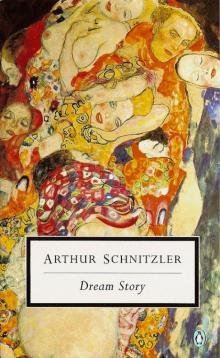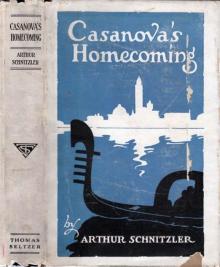- Home
- Arthur Schnitzler
Late Fame Page 9
Late Fame Read online
Page 9
Indeed, some of the “talentless ones” had turned briefly towards them.
Saxberger sat without saying anything while the shouts and the talk buzzed around him. He hadn’t really grasped it yet . . . he had seen the paper. It was the same one which a few days earlier had announced that, among others, the venerable poet Saxberger had agreed to take part. And after that friendly—if not admiring—mention, it was aiming these derisive phrases at him out of all of them. It was incomprehensible . . . He asked himself what he had ever done to those people? . . . “Several young gentlemen, some of them already somewhat long in the tooth . . .” Was it even allowed, to take a decent person who had done nothing wrong and treat him like this? Long in the tooth . . . that was meant scornfully, he felt it—they were making fun of his age—of how he, the old fool, had started to associate himself with this circle of young people among whom he simply did not belong—with this society, by being with whom he declared himself to be just beginning.
And they, why weren’t they saying anything to him? Why weren’t they explaining that it was possible their meager attempts didn’t yet add up to much and that they still looked respectfully up to him—yes, why weren’t they apologizing, as would only have been proper, instead of speaking across each other and talking about themselves and then more about themselves and asserting that they were great geniuses after all and that they would show everyone.
And Staufner even turned to him to say, in an unmistakably sarcastic tone, “Well, and how do you feel about all this, maestro Saxberger?”
“Me?” he asked, but couldn’t say any more. He sensed that this “maestro” was not meant sincerely.
“Come on,” said Meier, smiling, “there’s no need for despair, not even if the idiot happened to be right and we really didn’t offer very much. We’ll just do it better next time, won’t we?” he added, looking at Saxberger as though this remark might also apply to him.
“Gentlemen,” said Saxberger, with a slight tremor in his voice, “I’ve already done it as well as I can . . . and you did all like it.”
“Hold on, hold on,” cried the others, “who here’s talking about the Wanderings? Hurrah for the Wanderings, hurrah for Saxberger!”
Saxberger held up his hand in protest. “No, no . . . I just mean, I’m not one of those who will still do better, I’m a bit too old for that.”
He smiled bitterly.
The conversation became quieter and the mood more conciliatory. They eventually agreed that they had got far more worked up than they needed to about this stupid review. This sort of thing happened to everyone when they were starting out. Yes, it would all be different when the books they were working on were published; this kind of nonsense was just what everyone had to put up with.
“Oh, for the love of God, Winder,” said Friedinger, and gave the little boy, who was sitting there disconsolately, a clap on the shoulder. “Why such a sad face, don’t let it get to you!”
“I . . . I—I can’t help it,” said Winder, so seriously and dolefully that the others had to laugh.
The waiter came and brought another evening newspaper. It was one of the less widely distributed papers, which they otherwise never read. Today, however, Staufner picked it up at once.
“There’s nothing in there,” said Friedinger.
“Oh ho,” said Staufner, and lifted his right index finger. They all fell silent and he read:
“A recital by Vienna’s best-known . . .” he looked up . . . “best-known literary society, ‘Enthusiasm,’ took place yesterday. Poems and novelettes by the young authors were read aloud, in part by established stage figures, and met with thunderous approval from the audience. The young poets, among whom were Messrs Staufner, Meier, Saxberger and Linsmann, doubtless merit the greatest hopes for the future, even if the fermenting must has not in all cases yet been transformed into powerful wine . . .”
Staufner put the newspaper down, and at first no one spoke.
“Well, that’s all right . . .” he finally said.
“That’s all right?” Bolling asked with heavy sarcasm.
“Of course, after all, it’s—at least it means well!”
“You think?” asked Bolling even more sarcastically . . . “All right then. Good night.” He laughed curtly, took his hat and went.
“Thespian vanity,” whispered Friedinger to Christian, without noticing that the latter was sitting beside Fräulein Gasteiner and clutching her hand to prevent her from leaving.
Pale with rage, she said: “I find one thing priceless, that on the basis of a speech written by Herr Blink, Herr Linsmann is held to be a promising poet . . .”
“Who said,” retorted Linsmann, “that this man has not read my other work?”
“He has read it,” said Meier definitively.
“Why . . .”
“This review,” said Meier, “is thanks to me.”
“How . . . what . . . don’t talk nonsense . . .”
“It’s true. From next month, I’m going to be a theater reviewer for this paper, and I used my connections.”
“It’s by you? . . .” repeated Staufner.
“Indeed.”
“Then you’re a very vulgar piece of work,” shrieked Staufner, and so shifted the ambiguous mood into a sudden clarity. “This,” and he banged his hand on the paper, “this is how a friend writes about us? These laughable banalities, that are nothing and mean nothing, are how you dismiss us?”
“Fermenting must, are we?” Friedinger screamed over him.
“I’m a fermenting must,” screamed Linsmann.
“Ahahaha,” laughed Staufner, and read with ironic emphasis: “. . . the young poets doubtless merit, hahaha, doubtless merit the greatest hopes . . . hopes . . . an idiot is what you are, and presumptuous to boot.”
Meier tried in vain to make himself understood. “The review wasn’t written by me, I just arranged it so they covered the recital . . . I just gave them the dates.”
“You should have given them other dates,” shouted Staufner. “You either stand up for something or you don’t . . .”
At this, Meier too became angry. “I did what I could. I couldn’t accept a new job and then use it right away to do some advertising for my friends.”
“Advertising! Haha . . .”
“Damn it, I can’t. You can see, I didn’t write a single syllable more about myself.”
“Write!! Write!!”
“No, not write—influence. I didn’t say one word more for myself than for any of you . . .”
“Marvelous,” cried Staufner, “marvelous! Shall I tell you in one word what you are?—A careerist!”
“Well,” cried Meier, “and do you want to hear in two words what you lot are—an ungrateful . . .” he held back the second word.
“Gratitude is what he wants, you hear that?” shouted Staufner.
It grew so loud at the table that shushing noises came at them from around the coffee house.
“He wants gratitude!” said Staufner in a lowered voice. “It’s outrageous, he’s lost all self-control.”
“You owe me,” retorted Meier. “Remember what I’ve done for you—even aside from that panegyric, for which I came close to compromising myself at the newspaper. Just remember . . . all that I’ve got hold of for you . . .” and in that moment his gaze touched almost imperceptibly on the old gentleman, Saxberger, who was sitting painfully ill at ease, embarrassed and unhappy amid this argument and staying only because he couldn’t summon the courage to leave.
“Go back to your paper,” screamed Staufner. “We’ll get on just fine without you.”
Meier stood up, took his hat and went without saying goodbye. He did not even say anything to old Saxberger, and went so far as to cast a poisonous glance at innocent little Winder.
“It’s suffocating in here today,” said Fräulein Gasteiner, who had gone first pale, now red with anger, and, as she stood up—she was again wearing the yellow jacket—she added: “I’m leaving. Are you co
ming, Christian?” She threw it at him like an order. Christian rose as well, said “Excuse me” and accompanied Fräulein Gasteiner out. At the door, she turned around a last time and waved conspicuously. Saxberger could not but notice that the parting was for him. He inclined his head.
“The old ham’s going to ruin that stupid boy.” “Old ham . . .” Saxberger had to nod to himself in agreement. He realized all at once that he had known that for a long time.
“It really is getting unbearable in here,” said Staufner. Let’s go outside . . . shall we?”
They stood. The waiter brought their coats and hats. They went out onto the street.
“Good night, gentlemen,” said Saxberger.
“You’re not coming with us?” asked Staufner.
“Thank you, but I’m tired.”
“Till tomorrow then,” said Staufner. They shook his hand, all quite cool and thoughtless—he was alone.
The evening was beautiful and, after the oppressive atmosphere of the coffee house, it was a solace to Saxberger to have the soft, quiet air move around him. The scene he had just witnessed had initially been almost incomprehensible to him. That these people were so furious just because Meier hadn’t praised them more than he had! . . . If he himself were to make any criticism of the review . . . he had been just slightly annoyed while it was being read by the cursoriness with which the report, in mentioning promising young poets, had named him as one of them. But when he heard that Meier had composed the review—then, then he had been astounded by the indifference of that gentleman, who only a few weeks previously had enthusiastically conveyed to him the tributes of Young Vienna . . . The enthusiasm had blown over a bit too rapidly—it must have occurred to them quite soon that they had come thirty or forty years too late. They hardly even took him seriously any more. What a change there had been in the way these young people spoke to him.
He realized that someone was walking alongside him. It was little Winder, who had already been there for some time without the old gentleman noticing. “What, you’re accompanying me? I’m sorry, I didn’t even see you.”
“Oh, please, please . . .” said little Winder. “I didn’t want to disturb you—I just—”
“Would you like something from me?” asked the old gentleman in a very friendly voice.
“Yes . . . a great, great favor—I’ve wanted to ask it for ever, because I have such great, such heartfelt respect for you—”
Saxberger looked at him benevolently. For all that he tangled himself up, the young man was telling the truth. His self-conscious words sounded genuine.
“Well, what is it that you would like to ask me for?”
“I kept not daring to ask—you’re always so sought after—and then, how many things have people already turned to you for . . . you see, it’s about me personally”—he added nervously.
“Well?” asked Saxberger.
“It’s that I would very much like to—I would like a candid judgment, an honest one from your own mouth, on whether I have talent or not . . . yes, you I can trust, it’s you I’d like to leave the decision to, because you should know, Herr Saxberger, my parents are very much against it.”
“And how am I supposed to decide whether you have talent?”
“That’s just it. I’d like to give you my stuff to read—I’d like—”
Saxberger raised a hand to ward him off. “My dear Herr Winder, please don’t take it badly, but it would be better if you didn’t . . . Of course you can give me your things to read, but a judgment—no, no—”
Little Winder became very sad. “But why?” he asked.
“Well,” replied Saxberger, and it came as a great relief to suddenly find the right words: “I don’t understand the first thing about it!”
“You, Herr Saxberger??”
“I give you my word, I don’t understand the first thing. If something was very beautiful or very bad, I might be able to tell you the difference, but to say whether you have talent or not?”
“But who can tell me then, if not you?”
“It’s difficult, without question—and especially difficult for people as young as you. While someone’s young, they might manage to get a few things together . . . and then . . . then it’s just over and you don’t know how it ended.”
“But I understand that very well,” said Winder, “that after a while you lose your pleasure in it, if you aren’t getting any encouragement or any recognition.”
“You think so? . . .” asked Saxberger, and thought for a few seconds. “And who, in the end, can guarantee you the encouragement and recognition?”
“Well, if you yourself felt like reading my pieces, you, Herr Saxberger, and then encouraged me . . .”
“Me, Herr Saxberger! Who am I, this Herr Saxberger? Who do you think I am?”
“Oh . . .”
“Maybe the young Saxberger was something—it’s possible, I don’t know it myself any more, because I no longer understand anything at all about it.” He was quiet. “My dear Herr Winder,” he then said, “go to someone else—I don’t really know why you’ve settled on me in the first place. The Wanderings! Tell me honestly—did you even like them that much? What was it that you liked about them?”
“The Wanderings?—Well . . . it’s the Wanderings that I haven’t read yet.”
The old gentleman stopped dead, truly startled. But then, as he saw this young person standing in front of him and staring shamefacedly at the ground, he had to laugh.
“You’ve not read them? Well, why, well—then why on earth do you admire me so much?”
Little Winder looked up at him again. “I just have such a boundless trust in you—you’re completely different from the others. Much friendlier in how you treat me. The others don’t take any notice of me. Please, Herr Saxberger, Meier promised that he would lend me the Wanderings—he promised all of us—but it just shows you can’t rely on other people.”
“All of you? . . . So none of you have actually—”
Saxberger laughed. He laughed as heartily as he long hadn’t. “Let’s make a deal,” he said to Winder, giving him his hand. “You don’t need to read my poems and in exchange I won’t read yours either—all right?”
“Herr Saxberger, are you angry with me?”
“But, child! The thought hadn’t crossed my mind.”
They had reached the old gentleman’s usual restaurant and Saxberger instinctively came to a halt. “I’ve reached where I’m going,” he said. “Thank you for keeping me company—and if you ever want to visit me, it would be a pleasure.”
“. . . Herr Saxberger—”
“Goodbye, Herr Winder, get home safely!” With those words, the old gentleman left little Winder standing where he was and opened the door to the restaurant where his old group of friends habitually met.
The air that billowed out smelt of beer, smoke and food. The well-known voices were talking over one another, loud and laughing. And it seemed to him that he was returning from a short, troublesome journey to a home that he had never loved but in which he now rediscovered the soft and muffled comforts of before. He sensed that he no longer wanted anything more, no longer needed anything more. He remained standing in the doorway for just a second, then strode decisively to his table, breathed out deeply and sat down with a smile. He knew no one would ever say “poor devil” about him here.
Little Winder stayed outside for a few minutes after the door had closed. Tears were in his eyes. He shook his head: I was wrong about him, he said to himself, and felt very abandoned as he slowly wended his way back through the quiet streets to the coffee house.
AFTERWORD
A LONGING for late fame awakes in Eduard Saxberger at an advanced age, when the Wanderings, the lyrical work of the early years in which he wrote poetry, is discovered by the young literary circle “Enthusiasm.” Memories of the time when he himself was “one of the best and proudest in a circle of young people who [. . .] did not want to be anything but artists” make him aware of the
tragedy of his “whole sorry life.” Elevated by his new devotees, by “Young Vienna,” to the status of idol and “maestro,” Saxberger readily adopts their idea of him as his own self-image: “I am a poet.” His life as a civil servant he now considers only a “mask” behind which he has had to hide for all these years.
As, however, he is quickly forced to realize that he has come a very long way from his days as a poet and become completely estranged from his early work, the story experiences its first crisis and turning point, an instance of peripeteia as described in Gustav Freytag’s theory of drama—and Schnitzler’s estate also contains a sketch with the title “On the venerable poet as a drama.”[1]
Even the scene of Saxberger’s former poetic inspiration, where the best verses had always come easily to him, the banks of the Danube canal, is no longer as it was: the “whistling of locomotives and the distant groaning of the steam trams,” the “tall factory smokestacks [that] stretched above them into the sky” and the “miserably dressed people” all belong to the backdrop of a modern city. Saxberger does not see himself as equal to the impressions of the modern world’s sounds and images—the aesthetic stimuli of a radical modernity—and so “the few poor thoughts he had already caught were fluttering off again.” The final crisis, however, and the “catastrophe” in Freytag’s sense, befalls the protagonist at an evening of recitals put on by the young literati, when, after some of his own poems have been read, he hears amid the thunderous applause someone in the audience say the words, “Poor devil.” Words that resonate constantly in his head and determine all his thoughts thereafter—very similarly to the “stupid boy” said by the baker in Schnitzler’s Lieutenant Gustl. The story’s downward spiral then takes its course inexorably.
•
In this novella, Schnitzler also addresses the, for him sometimes so vexed, question of the negative dialectic between artistic work and the bourgeois life. “Med[ical] and poet[ic] worldviews are beating each other up in the most amusing fashion in my so-c[alled] soul,”[2] reads his diary entry on 17th April 1880, and at the beginning of that year he had already given himself this far from rosy prognosis: “If I were only as much of an artist as I have an artist’s temperament [. . .] my future will be: ending up a mediocre doctor!”[3]

 Dying
Dying Late Fame
Late Fame Dream Story
Dream Story Casanova's Homecoming
Casanova's Homecoming